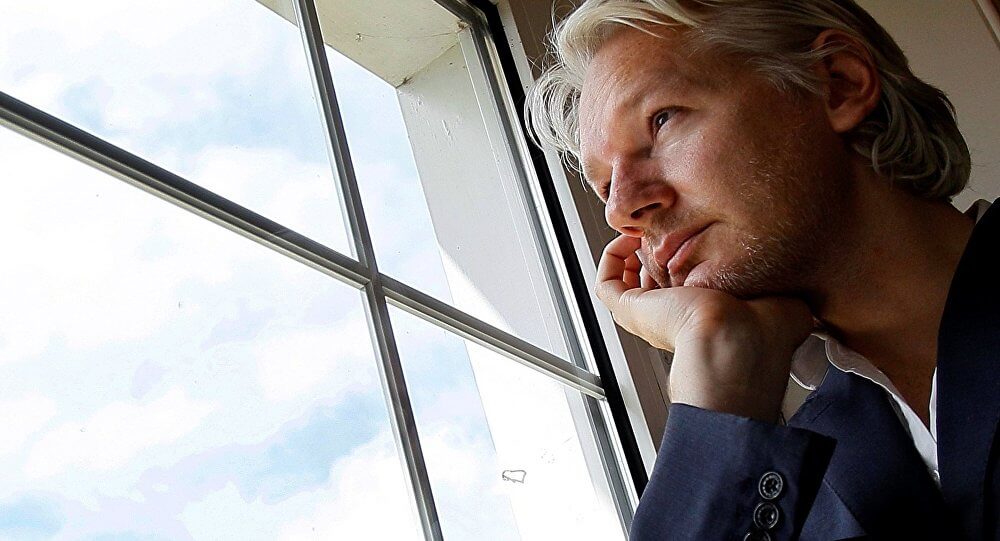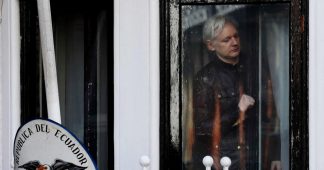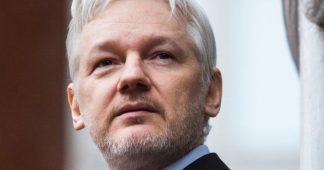Posted on
For over two months Julian Assange had no internet access and no contact with anyone besides his lawyer. Fifteen days is prohibited by the UN as prolonged solitary confinement under the Mandela Rules.
His situation now appears unchanged except that he was visited last Thursday by two officials from Australia’s High Commission. It has not yet been reported what was discussed, but if consistent with that government’s action to date this would be an exercise to wash their hands of him, much as Ecuador appears to be doing.
According to Glenn Greenwald’s interview of Rafael Correa, former President of Ecuador, in 2016 his “government told Assange that it thought his attacks on Hillary Clinton were becoming excessive and briefly suspended his Internet connection to underline its concerns.” Correa then qualified this by saying, “We never intended to take away his Internet for an extended period of time. That is going way too far.”
By the standards of the UN it was going too far anyway, since from July 2016 it “condemns unequivocally measures to intentionally prevent or disrupt access to or dissemination of information online.”
Lenin Moreno, who succeed Correa just on a year ago, was recently quoted as saying, “Let’s not forget the conditions of his asylum prevent him from speaking about politics or intervening in the politics of other countries. That’s why we cut his communication…There are two types of liberty. The responsible liberty and the cave liberty in which everyone thinks they can do whatever they want, whenever they want and however they want. That’s not liberty. Liberty must be used with a lot of responsibility.”
Moreno’s latter remark here might only seem to be commonsense, until thought through in context. If a child uses a megaphone to rail at passersby, their parent may be duly expected to curtail it. But if a newspaper releases leaked information in the public interest, to some party’s inconvenience, curtailing that would be oppressive. So it should be borne in mind that in addition to being a self-determined adult and Ecaudorian citizen, Julian Assange is a multi-award-winning publisher.
Suppose he were not merely an Ecuadoran citizen, but born, raised and resident in Quito, capital of Ecuador. Nothing should have prevented his role as the outspoken editor in chief of WikiLeaks in that scenario. What should then be permissible to end it there? Should they put him in jail or under house arrest, isolating him physically and digitally, just as they have in his current “refuge”? That and any comparably effective mode of gagging could only be the act of an intensely repressive regime. It would also carry the special disgrace of being solely to appease foreigners.
So how does it presently excuse Ecuador that he is enduring these conditions in their London embassy rather than jail or his own private dwelling? It quite simply doesn’t, and it is a distracting confusion to portray this as a house guest embarrassing their host. Assange is not a guest but a citizen and recipient of political asylum literally besieged behind the front door by foreign powers. Nor is there a personal host, as no person owns the embassy. Officials decide its affairs, but this involves accountability and the present decision lacks a valid account.
The sole duty of officials everywhere is attending to the interests of their people without fear or favor, and according to the rule of law. Instead we ironically see here the worst of Moreno’s “cave liberty” in violation of codified human rights.
Nobody ever assumed that Assange spoke for Ecuador, ergo nothing is diplomatically relevant here besides cascaded oppression. The sole concern is with strategic ramifications of his influence, and this was not originally Ecuador’s concern but shamefully became so with nefarious foreign pressure.
Only a sham of asylum could be conditional on “not speaking about politics”, particularly when granted for political persecution. There is debate about whether states ever have a right to silence people, but none are claiming that this could be outside a legal framework, contrary to fundamental provisions of a national constitution, and apply to content that is not remotely obscene, deceitful, coercive or transactional. Hence Moreno leaves all of that tacit behind allusion to invented conditions of asylum and “responsible liberty”.
The chief allegation of irresponsibility is of course abetting Putin’s 2016 US election hack. Yet besides that alarmist premise remaining unproven, this concern is significantly wrongheaded. Were the devil himself to use the New York Times anonymous drop-box they would be right to publish the content if they thought it was in the public interest. Any downside that slips by them is also unlikely to be worse than ditching this method, which would vastly increase the risk of whistleblowing.
Devil’s advocates often make good points. When fear of abetting enemies overrides adherence to rationality the immediate result is only hysteria and the final results naturally accord with it.
Fortunately a brave editor with the data respected the fact that the DNC defrauding Bernie Sanders was pertinent news. A real democracy doesn’t regret that kind of thing due to election results. Yet Sanders might have won if superdelegates had not stuck with the less popular candidate.
Whether it’s Assange’s comments about Catalonia or publication of forwarded DNC data, calling such irresponsible by casting it as a mode of foreign interference is grasping at shadows of windblown straws. All people and institutions on this planet are interrelated stakeholders and it is generally irresponsible to neglect to submit any suppressed truth. Most err on the side of silence through being complicit, apathetic or intimidated.
Assange did not err in these ways and is thus being persecuted to raise the baseline of intimidation. Most complicit in this persecution is the mainstream media, especially in Britain, which has cultivated a sport of snidery toward Assange and can’t recall what its moral footing is supposed to be when oppression of political speech goes this far over the top on their watch.
He is in need of hospital services and effectively in solitary confinement, the UK refuses to assure against extradition to the US (which repeatedly signals intent to prosecute him) and will not even comment on whether they have an extradition request. Somehow it doesn’t have much of a ring in this context to exhort him to man up and walk out to face arrest for the grave offense of skipping bail to receive political asylum. But the British press doesn’t appear to know any other song to join the chorus of, or comprehend that it’s effectively their own dirge.
Who would have guessed that this is how it goes in London when the CIA is favor of the year? Perhaps all it takes is a reboot of cold war hysteria. Never mind that the incoming director is famous for torture and destroying evidence, or that the departing one declared WikiLeaks a hostile intelligence agency not covered by the first amendment.
This is beyond dangerous for Western press freedom, which is already decomposing into “responsible liberty” complicit with veiled oppression. Yet there is no disguising the intense and unwarranted duress on Assange to follow suit. Will this be a shock to restore zombie journalists to themselves? Could there be some eleventh-hour integrity in one of the four governments concerned? One can always hope, though all these have proven unworthy of trust.
Ergo, push.
* Dr. Simon Floth is an Australian analytical philosopher who has lectured in metaphysics and logic at the University of New England and is currently researching on religion. He was an early contributor to WikiLeaks, refining vision and experimenting in collaborative analysis. Since 2004 various independent sites have featured his political articles. He can be reached at simonfloth@hotmail.com.









